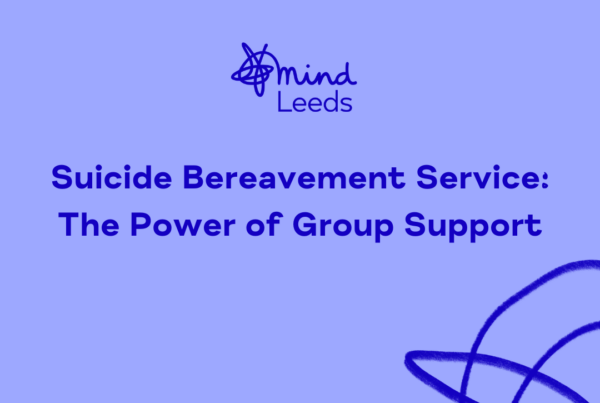Content warning: suicide, suicide bereavement, stigma around suicide, grief
We hope that by sharing stories and information from our Suicide Bereavement Services, we can make those who have been bereaved by or affected by someone taking their own life feel less alone. We also aim to educate those who have not been impacted around how losing someone to suicide differs from other experiences of loss. Overall, we hope this will continue to break down the stigma that still exists around deaths by suicide.
Disenfranchised grief is when someone’s experience does not fit in with the most common attitudes about dealing with death and loss. This could be the attitudes of someone’s local community, their family, or society at large.
Put simply, it means someone’s grief is not seen as ‘valid’. Grieving is either not allowed, actively discouraged, or not expected. Examples can be the loss of a pet; losing an abusive family member; or experiencing the death of a patient or client.

This can have a negative impact on the grieving person’s wellbeing, as studies have shown that social support during grief can help prevent depression, PTSD and even suicide.
Here, our suicide bereavement services team discusses disenfranchised grief in relation to suicide loss.
What does disenfranchised grief look like in suicide bereavement?
Suicide is one of the most common causes of disenfranchised grief. This is because people who have lost someone to suicide may feel like they cannot talk about their loss without judgment or criticism. They sometimes feel like they may be to blame in some way for the death, or that they should have been able to prevent it. The misconceptions around someone having “chosen” to die by suicide factors into this.
Sometimes, a person’s grief becomes disenfranchised because their relationship to the person who died by suicide is not seen as significant. Comments might be along the lines of “they didn’t even know them” or “they weren’t that close”, trying to suggest that this person’s grief is disproportionate.
Complex relationships can cause disenfranchised grief, for example, when someone has lost an abusive partner or an estranged family member to suicide. This undermines the fact that we can still love and care for someone whose behaviour could be seen as (or undeniably was) problematic.
People not being aware that someone is grieving following a suicide can also cause disenfranchisement. This includes the loss of a partner where the relationship wasn’t public knowledge, or an LGBTQ+ partner that can’t be discussed because one or both partners weren’t out.
Different cultures have different ways of grieving, and this can sometimes cause disenfranchised grief. For example, children of immigrants can feel a disconnect between the way their family grieves and the way they feel. Likewise, if someone does not observe the same religion as their family (or if they practice their religion in a different way), this can lead to disenfranchised grief.
This is by no means an exhaustive list, and lots of instances of disenfranchised grief in suicide are complex. Sometimes, it can even come from social expectations that we have internalised.
If you have ever felt as though you need to ‘justify’ how or why you mourn, you have experienced disenfranchised grief.
How to cope with disenfranchised grief
The first thing to know is that all grief is valid, and no experience is less or more worthy of support.
Our team has put together some tips on coping with disenfranchised grief:
- Allow yourself to grieve – even if others don’t validate your grief, or if you fear they won’t, remember that all of your feelings are valid
- Don’t bottle up your feelings – it’s important to allow yourself to feel your emotions, even if they are difficult
- Talk to someone you trust – this can help you to process your emotions and feel less alone. If you don’t feel comfortable talking to a friend or family member, there are many other people who can listen, such as a therapist or suicide postvention practitioner
- Don’t feel you have to explain yourself to others
- Accept help if it’s offered – sometimes we can internalise disenfranchisement, and this means we don’t feel ‘deserving’ of support. You do deserve support
- Try creating a ritual – if you don’t feel able to publicly acknowledge your grief yet, find a ritual which will help you process your feelings. This could include lighting a candle or visiting a special place
- If your disenfranchisement stems from cultural differences – remember that cultures are man-made and not concrete. You can create your own culture
- Seek professional help – a counsellor or a suicide bereavement practitioner will listen to your experiences without judgement. This could help you explore your feelings and be able to more comfortably deal with or express your grief
- Take care of yourself. Make sure you are getting enough sleep, eating healthy foods, and exercising. These things can help you to cope with stress and improve your overall well-being
- Be patient with yourself. Grief is a process that takes time. There is no right or wrong way to grieve, and there is no set timeline
If you have been affected by suicide, please consider accessing our Suicide Bereavement Services. You can find more information on the service here: https://www.leedsmind.org.uk/suicide-bereavement-services-west-yorkshire/
You can find more information and advice around losing someone to suicide on Mind’s website.



